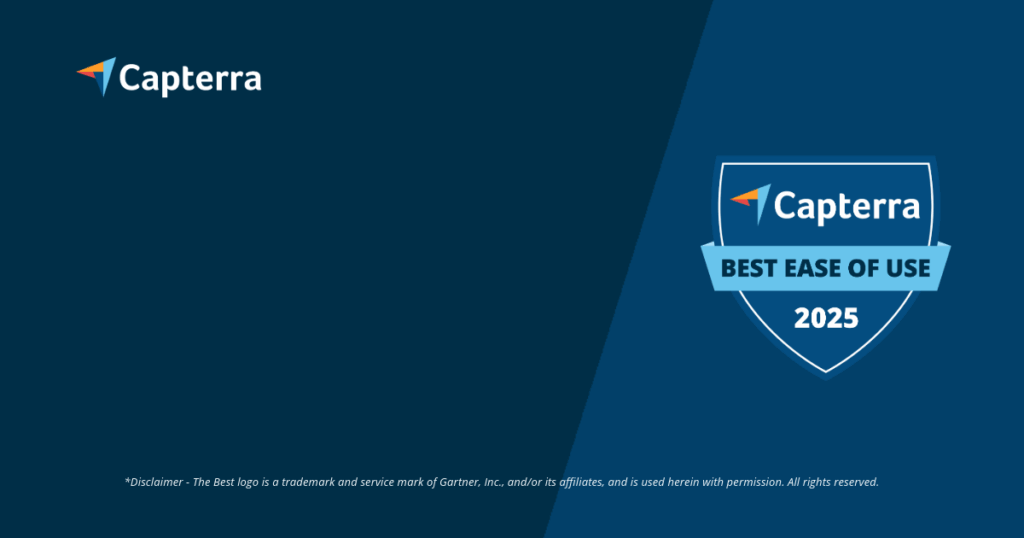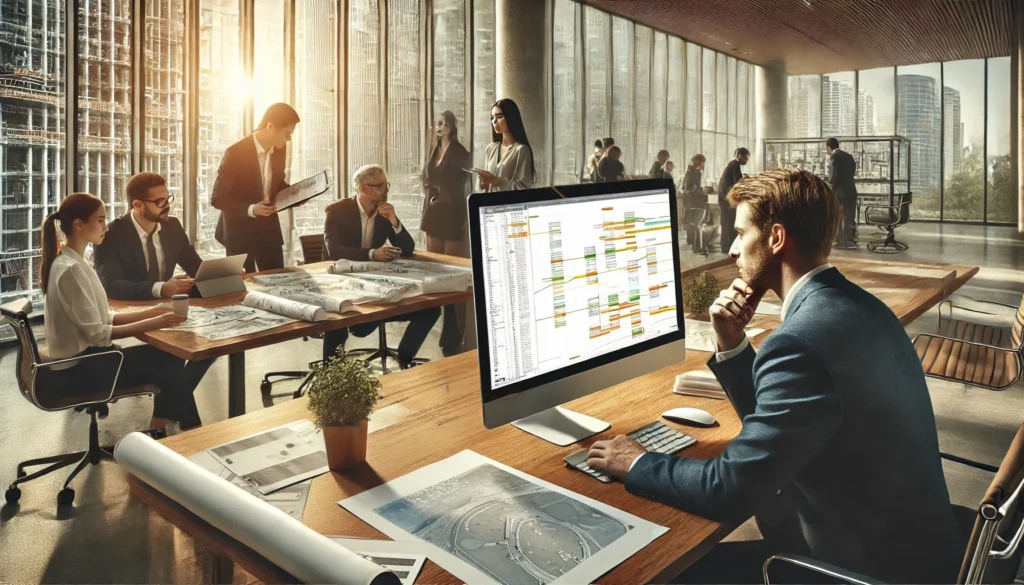ERP software in the construction industry: Your foundation for greater efficiency and smooth projects
What exactly is ERP and why is it so important for us in the construction industry?
Maybe you’ve asked yourself that as well. ERP stands for Enterprise Resource Planning – it refers to software solutions that help us as a company manage and optimize all our business processes centrally. Especially in our construction industry, where we deal daily with complex projects, tight schedules, and significant cost pressure, a specialized erp software construction industry is not just worth considering, but often the key to success. It directly addresses the challenges we know: detailed project management, precise cost control, and efficient resource planning. Unlike standard ERP systems, solutions specifically developed for us in construction provide much more tailored functions. This is exactly our approach here at Valoon GmbH, where we focus on easy communication and data processing – often with much more precise features. These are tailored to our typical workflows and requirements, especially when it comes to process optimization in construction . With the right software solution, we can finally break down information silos and create a unified data foundation. This is the basis for smart decisions and significantly drives the digitalization in our industry .
- Central control: Enables the central management and optimization of all business processes.
- Industry-specific functionalities: Offers tailored functions that are aligned with the typical workflows and requirements of the construction industry.
- Unified data foundation: Breaks down information silos and creates a foundation for informed decisions.
- Improved information flow: Optimizes communication and data exchange between the construction site and the office.
Why do we even need a well-thought-out ERP solution? Simply put: because our construction sector has truly unique requirements. Standard solutions quickly reach their limits. Often, they lack the ability to integrate CAD data or BIM (Building Information Modeling) or to represent our specific billing procedures. Good industry software, however, connects all areas of a construction company – from the initial cost estimation through execution to financial accounting. The result? A clear, transparent view of all our projects and resources. The choice of the right software is therefore a crucial step to remain competitive and make our construction projects more efficient. This central data management that such a system brings is the key to sustainably improving the information flow between the construction site and the office – and this aligns perfectly with our mission at Valoon GmbH to simplify communication for you.
What benefits does the implementation of ERP software in construction companies really bring?
When you implement the right erp software construction industry you open up a whole range of benefits for your construction company that go far beyond mere process optimization. Think about centralized data management and automated processes – this leads to a significant increase in efficiency. Specifically, this means: less manual work, fewer errors, and quicker responses when something changes during the project. Thanks to an integrated solution, you can plan and execute your projects better. This helps you utilize resources optimally, meet deadlines more reliably, and ensure the quality of your construction execution. Do you want to know how the right software can transform your projects? Then start your inquiry for a personalized consultation through our contact form.
Here we have summarized some of the key benefits you can achieve by using ERP software in the construction industry:
- More efficiency: By automating routine tasks and centrally managing your data, you reduce manual effort and make your processes significantly faster. A good software of this kind helps to minimize sources of error and ensures smooth operations.
- Better cost control: You keep your budgets and expenditures in view at all times. Thanks to real-time data, you can calculate precisely and intervene early when there are deviations. This helps to reduce costs and minimize risks.
- More transparency: An integrated erp software construction industry gives you a comprehensive overview of all your projects, resources, and financial flows. This creates transparency and enables you to make informed decisions at all levels of your company.
The core functions of ERP systems: What makes them the backbone of successful construction projects?
Project and financial management: The success factors in focus
One can say that a powerful project management module is truly the heart of any erp software construction industry. Imagine functions like Gantt charts that help you visualize project timelines and the dependencies between individual tasks clearly. Assigning resources – whether personnel or machinery – and continuously tracking progress are simply essential to keep your projects within time and budget. Equally important is solid financial management. A good system integrates project cost accounting, budget control, and the entire billing and payment processing. Detailed financial reports and analyses, often supported by integrations like, provide you with the transparency you need for economic decisions and a solid financial accounting in construction companies . These features are fundamental to ensuring the profitability of your construction projects.
- Project management: Includes features like Gantt charts for visualizing schedules, resource allocation, and continuous progress tracking.
- Financial management: Integrates project cost accounting, budget control, billing, and payment processing for financial transparency.
- Material and resource management: Covers inventory management, purchasing management, and equipment/machine management.
- Personnel management: Supports time tracking, payroll, scheduling, and compliance requirements.
- Document management and BIM: Enables central, secure storage of documents and integration of Building Information Modeling data.
Manage materials, resources, and personnel optimally
The efficient management of materials and operating resources is another important aspect covered by modern software solutions. Think about inventory management to avoid bottlenecks or overstock, optimized purchasing management including supplier evaluation and communication, and of course detailed equipment and machine management. The latter helps you plan machinery usage, monitor maintenance intervals, and analyze utilization – all to maximize the lifespan of your equipment and minimize downtimes. Closely related to this is personnel management. A comprehensive solution supports you with time tracking directly from the construction site, payroll accounting considering industry-specific regulations, scheduling based on qualifications and availabilities, and managing safety trainings and compliance requirements. The aspects of a Construction Management Software are particularly important here.
Don’t forget document management and BIM integration
We all know: In the construction industry, huge amounts of documents are generated daily – from plans and contracts to reports and permits. An integrated Document management software construction module within the erp software construction industry is therefore absolutely essential. It allows you to store all project-related documents centrally and securely, control access and versioning, and facilitates collaboration within teams and with external partners. One aspect that is becoming increasingly important is integration with Building Information Modeling (BIM). If your software can process BIM data and use it for estimation, resource planning, and progress tracking, that is a significant competitive advantage and promotes a seamless digitalization of construction processes. The seamless linking of 3D models with commercial and operational data improves planning quality and reduces errors – a real win!Choosing the right ERP software: How to find the tailored solution for your construction company
Requirement definition: The first step to suitable ERP software
Choosing the right erp software construction industry begins, as is often the case, with good preparation – namely a detailed definition of your specific requirements. Our tip: Create a requirements specification. Clearly define your goals for the software implementation, your budget, and the planned number of users. Also consider your existing IT infrastructure and your growth plans for the future. It is particularly important to describe the required functions in detail: Which processes need to be represented? What integrations with other construction software or external systems are necessary for you? Think about areas such as cost estimation according to ÖNORM or GAEB, mobile site management, or the connection of supplier portals. A careful needs analysis, as conducted within the framework of a software implementation project plan is the basis for a successful implementation of such software and protects you from costly mistakes. The better you know your needs, the better you can compare the offers from different providers.
- Requirement definition: Start with a detailed definition of your specific needs and create a requirements specification.
- System choice: Carefully weigh the pros and cons of industry-specific solutions against standard ERP systems.
- Provider expertise: Pay attention to the experience and proven expertise of the software provider specifically in the construction industry.
- Support and scalability: Check the offered support services, training options, as well as the scalability and flexibility of the software.
Industry-specific vs. standard: Making the right choice for the construction industry
When deciding for such a solution, you often face the choice: an industry-specific solution or a standard ERP system? For us in the construction industry, the advantages of specialized systems often outweigh. These often come with built-in functionalities that are specifically tailored to the complex processes in construction – think of CAD integration, BIM capabilities, support for specifications (e.g., GAEB, ÖNORM, SIA), and compliance with specific construction regulations. Standard ERP systems, on the other hand, often require extensive and costly modifications to meet the needs of the construction industry. Furthermore, they may not always optimally represent the specific workflows, such as in the area of construction project management software, which cannot always be optimally mapped. A specialized solution understands the language and processes of the construction trades and can thus help you achieve efficiency gains faster. The provider’s expertise in the construction industry is a decisive criterion here, as well as.
Important criteria in choosing your ERP software provider
Choosing the right provider for your industry software is at least as important as the software itself. Pay attention to the experience and expertise of the provider specifically in our construction industry. Feel free to ask for references and case studies from comparable construction companies to get an idea of the performance and reliability of the solution. Another important point is the support and training services offered. A good onboarding of your employees and prompt, competent support in ongoing operations are crucial for the acceptance and long-term success of the software implementation. Also, check how scalable and flexible the software is: Can it grow with your company and adapt to changing requirements? A future-proof erp software construction industry should be modular and offer options for integrating other systems, so your investment is secured for the long term.Leading ERP providers at a glance: What specialized solutions are available for us in construction?
A look at leading ERP systems for the construction industry
The market for erp software construction industry is diverse and offers a wide range of solutions that set different focal points. Large, internationally recognized systems like are known, for example, for improving project planning and reducing costs. Meanwhile, scores with dynamic project management tools and robust accounting functions. Acumatica focuses on real-time connectivity between the construction site and the office, while Sage provides comprehensive tools for project cost monitoring and resource allocation. Also, is a popular base for many industry-specific ERP solutions and offers customizable modules with AI-supported insights. These established systems often have a wide range of functionalities, which may be too extensive or complex for smaller or highly specialized construction companies. Thus, selecting the right solution depends heavily on your individual needs and the size of your company.
Specialized ERP solutions for the unique requirements of construction
In addition to the large generalists, there are several providers that explicitly cater to the needs of us in the construction industry. These often offer even deeper integration of construction-specific processes. MEGABAU 365, based on Microsoft Dynamics 365 Business Central, is such a SaaS solution developed specifically for construction companies and supports standards like ÖNORM and GAEB. RIB iTWO is known for its strong 5D-BIM integration, which enables detailed cost estimation and project visualization. NEVARIS also provides tailored functionalities for project monitoring and Document management. Another interesting solution is 4PS Construct, a fully integrated solution that also builds on Microsoft Dynamics 365 Business Central and promises seamless project transparency. Such specialized systems often deliver better precision for the complex requirements of a modern industry solution.
Selecting the right software is a critical success factor. Here is a brief list of specialized providers you should keep an eye on:
- MEGABAU 365: Offers a SaaS ERP solution that is deeply integrated with Microsoft Dynamics 365 Business Central and supports country-specific standards like ÖNORM and GAEB.
- RIB iTWO: Known for its 5D-BIM integration, which enables detailed cost estimation and visualization of construction projects, greatly supporting the process optimization in construction enormously.
- NEVARIS: Provides tailored functionalities for project monitoring, document management, and controlling, and is often praised for its adaptability to specific company sizes.
- 4PS Construct: A fully integrated ERP solution based on Microsoft Dynamics 365 Business Central that promises seamless transparency across all business processes in the construction industry.
Mastering ERP implementation: Successfully introduce through structured planning and adaptation
Planning and preparation: The A and O for your ERP project
A successful implementation of an erp software construction industry does not begin only with the go-live, but much earlier – with a truly careful planning and preparation phase. Our advice: Assemble a competent project team consisting of representatives from all relevant departments and establish clear responsibilities. A detailed software implementation project plan is invaluable here. A critical point that many underestimate is data migration: Your existing data needs to be reviewed, cleaned, and prepared for transfer to the new system. Take this effort seriously, as the quality of your data significantly determines the usefulness of your new software. In parallel, you should plan and conduct training measures for your employees early on. This promotes acceptance and ensures a smooth transition. We at Valoon GmbH place great importance on making software easy to use to keep training efforts low – an aspect you should also consider when selecting a comprehensive software solution.
Customization, configuration, and integration into your system landscape
Rarely does a erp software construction industry „off-the-shelf“ perfectly fit all individual needs of a construction company. Therefore, customizations and configurations are necessary to optimally adapt the software to your specific processes. This can include setting up workflows, customizing forms and reports, or even developing specific additional functions. Another important aspect is the integration of the new software into your existing IT system landscape. Interfaces to, for example, your accounting software, CRM systems, estimating programs, or other specialized construction software must be carefully planned and implemented. Only in this way can you ensure a seamless data flow and consistency of information across all systems. Collaborating with an experienced implementation partner who understands the construction industry is a great advantage to create a truly efficient erp software construction industry solution.
Testing phase and go-live: Ensure smooth operations
Before you officially launch your new software solution, thorough testing is essential. During the testing phase, all configured processes and interfaces are subject to rigorous checks. This allows you to identify and rectify errors early. Pilot projects are often conducted in selected departments or for specific construction projects for this purpose. This enables testing the system under real conditions and gathering valuable feedback from end users. The go-live, that is, the actual commissioning of the system, should ideally occur gradually to minimize risks and disrupt ongoing operations as little as possible. But even after the go-live, it is important to continuously monitor system performance and optimize processes. Only then can you fully benefit from your investment in this software and shape the digitalization of your company sustainably.Mobile and Cloud ERP: More flexibility and efficiency for the modern construction site
Mobile ERP: Data management directly from the construction site – is that possible?
The construction site is where we create value, but also often a place where information is difficult to access. Mobile ERP solutions, as part of a modern erp software construction industry, fundamentally change this. They allow you to capture data in real time directly on-site via tablets or smartphones. Your employees can digitally record working hours, material consumption, daily construction reports, or defects and immediately transmit them to the central system. This not only improves the accuracy of the data but also significantly speeds up communication and decision-making processes. The seamless integration of messaging services, as offered by our Valoon GmbH solutions, can further enhance acceptance and usage by your field staff, incorporating familiar tools into the software. Mobile ERP is key to increasing efficiency and improving collaboration between the construction site and the office – and an important part of any future-oriented erp software construction industry.
Cloud-based ERP solutions: More scalability and easier access
The importance of cloud-based ERP solutions for us in the construction industry is steadily increasing. A cloud-based ERP solution offers you the crucial advantage of being able to access all relevant data and functions regardless of time and place. Whether in the office, on the construction site, or on the go – project managers, site supervisors, and management always have access to up-to-date information. This not only promotes flexibility but also enhances collaboration in distributed teams. Further advantages include often higher scalability, as you can easily adjust resources as needed, and potentially lower costs for your own IT infrastructure, as maintenance and operation of the servers are handled by the provider. Many modern ERP systems, like , or solutions based on Microsoft Dynamics 365, are available as cloud services and enable construction companies to operate more agilely and competitively. The right software in the cloud can thus be a real game changer for you.
Security aspects of cloud ERP: Data protection and compliance in focus
When you use a cloud-based software, security aspects are of utmost importance. The protection of your sensitive company and project data must always be guaranteed. This includes compliance with the General Data Protection Regulation (GDPR) and other relevant regulations. Reputable providers of cloud ERP solutions invest heavily in security measures such as data encryption, access controls, regular security audits, and certified data centers. Therefore, when choosing a cloud provider for your cloud ERP solution, you should pay close attention to its security concepts and certifications. Clarify questions regarding data sovereignty, backup strategies, and contingency plans. Ensuring data security and privacy is one of the central challenges that we at Valoon GmbH also take very seriously, especially in integrating third-party services into our communication solutions and into every erp software construction industry.Challenges of ERP implementation: Ensuring employee acceptance, data quality, and budget adherence
Employee acceptance: The key to the success of your ERP project
Implementing new erp software construction industry is not just a technological project, but mainly a change project that directly affects your employees. Fostering acceptance within the team is therefore an absolutely critical success factor. Our tip: Involve your employees early in the selection and implementation process. Communicate transparently the goals and benefits of the new software and take concerns seriously. Comprehensive training and practical workshops help to break down barriers and familiarize users with the new functionalities. Show how the new software simplifies daily work, for instance through simplifying data collection or providing better oversight in the project management. A strong focus on user-friendliness, as pursued by Valoon GmbH, can significantly increase acceptance and reduce training efforts – which is especially important when introducing complex software solutions.
Data quality: The foundation for reliable decisions
The best erp software construction industry can only realize its full benefits if the underlying data are correct, complete, and up-to-date. Ensuring high data quality is therefore an ongoing task that should not be underestimated. It’s best to start rigorously cleaning and migrating your existing data well before implementation. Define clear data standards and responsibilities for data maintenance in the new system. Regular data quality checks and validation mechanisms within the system help to identify and correct errors early. The automatic structuring of unstructured communication into actionable project data, a core feature of Valoon solutions, can also help improve data quality and reduce manual entry effort in the context of such a software solution. After all, one thing is clear: Reliable data are the basis for informed analyses and better business decisions, which should enable you to erp software construction industry .
Budget and timeline adherence: Achieving goals with realistic planning and control
The implementation of such software is often a complex and lengthy project that demands significant resources – we all know that. Adhering to the budget and timeline is therefore a major challenge. A realistic project plan that considers all necessary steps, resources, and potential risks is absolutely essential here. A detailed software implementation project plan with clear milestones and responsibilities helps you keep track. Continuous monitoring of project progress and regular status meetings allow for early detection of deviations and prompt measures can be implemented. Plan buffer times for unforeseen problems and remain flexible to respond to changes. Transparent communication with the software provider and all internal stakeholders is crucial for successfully completing the project “ERP implementation” within the set parameters.The future of ERP systems: How AI, BIM, and sustainability are changing the construction industry
Artificial intelligence (AI) revolutionizes ERP processes in construction – really?
Yes, the integration of Artificial Intelligence (AI) in erp software construction industry Systems open up entirely new possibilities for optimizing processes and making decisions. AI algorithms can analyze vast amounts of data, recognize patterns, and create precise forecasts – for instance, for cost developments, material needs, or project risks. Predictive analytics, supported by AI, enables proactive risk management and forward-looking planning. Imagine: Routine tasks such as data entry, document recognition, or initial steps in Document management can increasingly be automated. This relieves your skilled employees, allowing them to focus on more value-adding activities. The industry software of the future will be intelligent and assist us construction companies in working more efficiently, precisely, and profitably. The ability to analyze and structure unstructured data, as often arises in daily communication, using AI is an area where we at Valoon GmbH are already pursuing innovative approaches – and this is also highly relevant for future ERP solutions.
Building Information Modeling (BIM) and ERP: Two worlds are coming together
Building Information Modeling (BIM) has now established itself as the standard for the digital planning and modeling of buildings. The seamless integration of BIM data into the erp software construction industry is a crucial step toward complete digitalization of construction processes. When we link 3D models with commercial and operational data from the ERP system, a continuous information chain is created – from planning through calculation and execution to the later management of the building. This improves collaboration among all project participants, reduces planning errors, and enables more precise cost and schedule control. Therefore, a modern solution must easily possess powerful interfaces to BIM systems or directly integrate BIM functionalities to fully exploit the advantages of this method. The
importance for increasing efficiency is, we are sure, undisputed.
Sustainability and ERP: Managing ecological responsibility digitally erp software construction industry.
Sustainability is becoming increasingly significant in our construction industry – and that is a good thing. We construction companies face the challenge of integrating ecological aspects into our processes and providing corresponding evidence. Future-oriented software can provide valuable support here. By thoroughly capturing and analyzing resource consumption, transport routes, and waste quantities, it helps reduce the ecological footprint of construction projects. Features to support sustainability reporting (e.g., according to ESG criteria) are becoming increasingly important to meet legal requirements and the expectations of clients and investors. The software can thus become an important tool for responsible and environmentally conscious construction by creating transparency over consumption and highlighting optimization potentials. This is an important aspect of a modern
- What typically belongs to such software when we integrate sustainability aspects? Resource management:
- It’s about optimizing the use of materials and energy to reduce waste and emissions. This also includes tracking supply chains and selecting sustainable building materials. Reporting and compliance:
- The software should help us create sustainability reports and ensure that we comply with environmental standards and regulations. A good software solution supports documentation for certifications. Life cycle analysis: process optimization in construction.
It can help us assess the environmental impact of a building over its entire life cycle – from planning to deconstruction. This is an important building block for a comprehensive
Invest in ERP software: Your key to greater efficiency and competitiveness
We hope it has become clear: Implementing a tailored erp software construction industry is more than just an option for us construction companies today – it is a strategic lever for greater efficiency, transparency, and competitiveness. By centralizing data and automating processes, your workflows in project management, in financial control, in resource management, and in communication will be significantly optimized. The ability to utilize real-time data for informed decisions, identify risks early, and manage projects precisely are invaluable advantages in our dynamic industry. A modern software of this kind not only supports core processes but also integrates forward-looking technologies such as mobile applications, cloud solutions, and BIM. Trust us, investing in the right solution pays off through cost reductions, quality improvements, and a strengthened market position.
A brief outlook and our recommendations for you as a construction company
The development in the field of erp software construction industry is advancing rapidly. Trends such as the increased use of artificial intelligence, deeper integration of BIM, and a growing focus on sustainability will shape the systems of the future. For you as a construction company planning to implement or modernize such software, it is critical to choose a solution that not only meets your current requirements but is also flexible and scalable for future challenges. Look for providers with proven industry expertise and a clear understanding of your company’s specific needs. Digitalization is an ongoing process, and a powerful software solution is the foundation for your long-term success. We at Valoon GmbH understand the importance of simple and efficient communication and data processing solutions and are happy to help you sustainably improve the flow of information between field and office.
Implementing such a solution is an investment in the future viability of your construction company. It enables you to manage complex projects confidently, optimize costs, and improve collaboration throughout the company. With the right software solution and a well-thought-out implementation concept , you can set the course for sustainable growth and increased profitability. Digital transformation offers enormous opportunities – seize this with a powerful software. Don’t hesitate and contact us today via our contact form, to start your individual consultation and find the suitable solution for your specific requirements. We are happy to assist you in optimizing your processes and elevating your construction projects to a new level.
What are the direct benefits of ERP software specifically for my construction company?
A specialized erp software construction industry optimizes your project planning and control, improves the cost control , and simplifies the resource management. The key is that it understands and supports your specific construction processes, leading to fewer errors and higher efficiency .
How does ERP software help improve communication between the office and the construction site?
Through a central data platform und , mobile access capabilities ensure that an ERP software guarantees all project participants – both in the office and on the construction site – always have access to stellt eine ERP-Software sicher, dass alle Projektbeteiligten – im Büro und auf der Baustelle – stets auf current information . This minimizes misunderstandings and speeds up decision-making processes. Valoon GmbH places particular emphasis on the integration of familiar messenger services.
Can an ERP software for the construction industry be integrated with tools my team already uses, like WhatsApp?
Yes, many modern ERP systems, especially solutions like those from Valoon GmbH, offer interfaces to commonly used applications. The integration of messengers like WhatsApp can significantly simplify the data collection in the field and increase the acceptance of new digital processes, as employees can continue to use familiar tools. What should I consider when selecting an ERP provider for my construction company?
Worauf sollte ich bei der Auswahl eines ERP-Anbieters für mein Bauunternehmen achten?
Pay attention to the demonstrated industry expertise of the provider. Check references and whether the software is scalable and customizable to your specific needs . Good support and training offerings are also important to ensure successful implementation and use. Are cloud-based ERP systems secure enough for my sensitive construction project data?, um eine erfolgreiche Einführung und Nutzung sicherzustellen.
Sind Cloud-basierte ERP-Systeme sicher genug für meine sensiblen Bauprojektdaten?
Reputable providers of cloud ERP solutions invest heavily in security measures such as data encryption, access controls, and certified data centers. Ensure compliance with GDPR and other relevant regulations. A cloud solution also offers flexibility and location-independent access..








